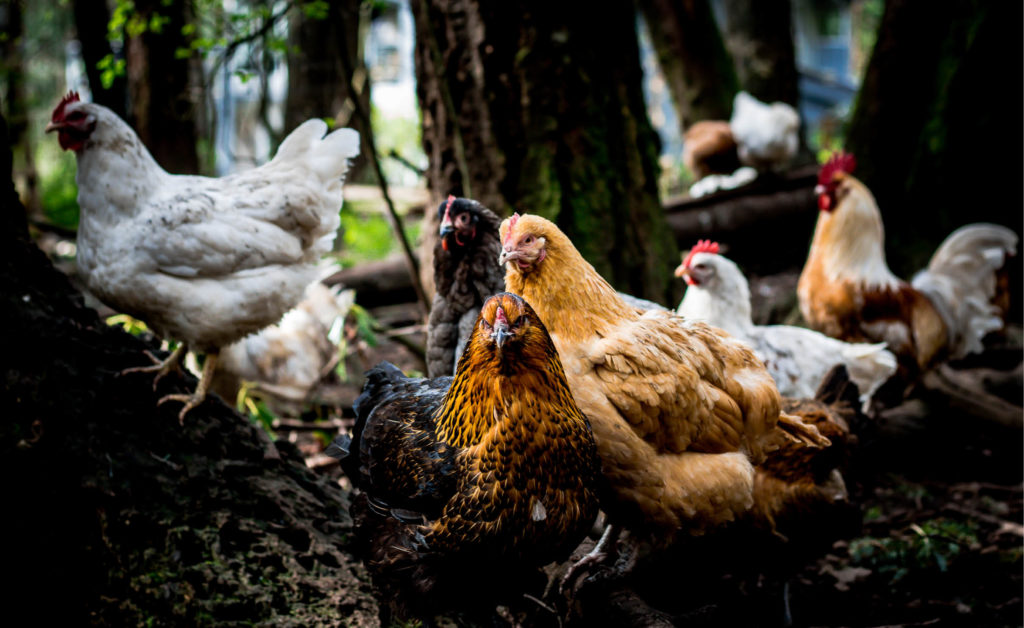by Jesse Holth | photo by Amanda Cribdon Photography –
With their low-maintenance attitude, ability to produce farm-fresh eggs, and lovable personalities, it’s no surprise that farmers have dubbed chickens “the gateway animal” – you could soon find yourself branching out into ducks, cows, horses or other furry friends! With more people embracing the trend of backyard chickens, here are some helpful tips on how to get that process started.
Get to Know Your Bylaws. Depending on where you live, there will be certain bylaws governing what animals you can or cannot keep. For example, roosters are not typically allowed on non-agricultural land, or land under a certain size. Most people who keep backyard chickens will likely start out with a few hens. Check to see if you need to register your chickens with the municipality.
There may also be bylaws around securing your chickens overnight – predators come out especially at dusk or dawn, and chickens need to be protected. Visit your local municipal website to see what restrictions you may have: in Central Saanich, you are allowed up to eight chickens or ducks on land less than 1,858 square metres; in North Saanich, you need at least 4,000 square metres. The Town of Sidney does not currently allow chickens at all (but some residents are trying to change this).
Building the Coop. Your chickens will need a little house of their own, so whether you decide to go completely DIY and build the coop yourself or get a bit of outside help, there are plenty of resources available online and through local organizations. Focus on how big the coop will need to be: how many chickens do you want? Three to five hens is a good place to start, particularly if you’re just looking for some fresh eggs. “There’s no one correct way to build a coop,” says Matthew Smith, of the 4H Fowl Creatures Poultry Club. You can definitely get creative with it. “It doesn’t have to be fancy; old playhouses from the kids can be great for chicken coops!”
If you’re not feeling quite that adventurous, you can get a “chicken coop kit” from a local retailer like Buckerfield’s or order one online – there are a variety of styles to choose from, and you won’t have to worry about designing it from scratch.
Where to Buy Chicks. You can find chicks at your local feed store, where the staff will also be able to help answer your questions about food, water, supplies and general chicken-keeping queries. Another surprise source for chickens? UsedVictoria! “My go-to answer about where to get chicks is always UsedVictoria,” says Matthew. “It sounds weird, but it’s really just a classifieds website; it’s a fantastic resource, and the poultry people really use it a lot for local birds,” he explains.
Make sure you know whether you’re getting hens or roosters. This is called getting “sexed” chickens (which sometimes costs a bit extra) and will ensure you have laying hens to provide eggs. You also don’t want to end up with a rooster if the bylaws won’t allow it! It’s a good idea to get at least two hens so they can keep each other company.
Local resident Ashley Ruffle has kept chickens for over a decade. “We started with six chickens, when our kids were little; we really loved the idea of having fresh eggs,” she explains. “We wanted the kids to have that experience.” Ashley says they really had no idea what to expect, and they just jumped in headfirst. “It was a trial by fire – we got the chicks on UsedVic and had to have them under a heat lamp. We kept them in our home, and we learned quickly that they are so cute but very dusty!”
Ashley says the Facebook poultry network (Vancouver Island Backyard Chickens and Ducks) has been an invaluable resource – it’s a group for people who own chickens and want to share their experiences. She also points to the 4H Fowl Creatures club that Matthew belongs to. “They are a wealth of knowledge, I can’t say enough good things about that club; from kids to leaders, anything you want to know about poultry, they will be able to answer.”
Additional Tips. Ashley: “If you feed scraps to your chickens, be careful it won’t affect the flavour of your eggs – we learned this the hard way with things like salmon skins or onion!”
Matthew: “There are lots of predators on the Island – from racoons to minks to birds of prey – and there can be very unfortunate consequences if you’re not prepared. Also consider what you will do with your chickens over the winter.”
Ashley: “Your chickens will need a roosting area, somewhere up high where they can sit and perch.”
Matthew: “It’s important to have good relationships with your neighbours, and be transparent about what you’re doing.”
Resources. Small Flock Poultry Health: https://tinyurl.com/2563jh5t; BC SPCA: https://spca.bc.ca/news/backyard-chickens/; District of Saanich: https://tinyurl.com/ypwsk9wp.




